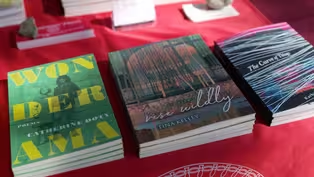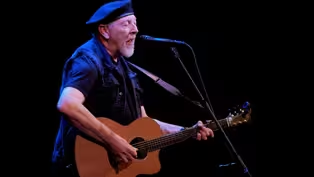State of the Arts
Clifford Ward: I'll Make Me a World
Clip: Season 43 Episode 6 | 9m 2sVideo has Closed Captions
The "I'll Make Me a World" exhibition presents a decade of Clifford Ward's work.
The electrifying new exhibition "I'll Make Me a World" presents a decade of Clifford Ward's work envisioning a Black future that reclaims and reinterprets the symbolism and history of the past. We meet up with the artist in his studio where he prepares for a retrospective at Grounds for Sculpture in Hamilton, NJ and at the opening of hte exhbition's "prologue" at Artworks in Trenton.
Problems playing video? | Closed Captioning Feedback
Problems playing video? | Closed Captioning Feedback
State of the Arts is a local public television program presented by NJ PBS
State of the Arts
Clifford Ward: I'll Make Me a World
Clip: Season 43 Episode 6 | 9m 2sVideo has Closed Captions
The electrifying new exhibition "I'll Make Me a World" presents a decade of Clifford Ward's work envisioning a Black future that reclaims and reinterprets the symbolism and history of the past. We meet up with the artist in his studio where he prepares for a retrospective at Grounds for Sculpture in Hamilton, NJ and at the opening of hte exhbition's "prologue" at Artworks in Trenton.
Problems playing video? | Closed Captioning Feedback
How to Watch State of the Arts
State of the Arts is available to stream on pbs.org and the free PBS App, available on iPhone, Apple TV, Android TV, Android smartphones, Amazon Fire TV, Amazon Fire Tablet, Roku, Samsung Smart TV, and Vizio.
Providing Support for PBS.org
Learn Moreabout PBS online sponsorship[ Music plays ] Warlick: Now, you know that whatever imperfections you don't -- you know, that you have on here that you don't particularly care for, you can get rid of.
[ Music plays ] [ Music plays ] Okay.
Ready?
Ward: Mm-hmm.
[ Music plays ] I'm free!
Warlick: [ Chuckles ] Ward: Wow.
Oh, my God!
Warlick: What do you think?
Ward: I think it's great.
Warlick: Yeah.
Ward: Wow.
Warlick: You could just fill this in.
Ward: Right.
Warlick: And just a little bit here.
You could either make it solid, or you can leave holes in it -- however you choose.
[ Music plays ] Ward: I am making up for lost time right now, because there's so much that had been suppressed over the years.
I'm trying to compensate for what I don't know about myself.
[ Music plays ] Art allows you to express things that you might not want to say otherwise.
[ Music plays ] [ Music plays ] When art is cast, it's cast in pieces.
The pieces have to be reassembled so that you wouldn't know that it was ever severed.
A good metal chaser is the person that would connect the pieces together.
[ Music plays ] I took that lesson into my own life.
[ Music plays ] I was brought up in a housing project called Marion Gardens in Jersey City.
I lived in the ghetto.
[ Music plays ] As a kid, we were always taught anything associated with Africa or darkness is bad.
[ Music plays ] African-Americans have been severed from the continent and dispersed around the world in the largest migration in history, which is the African slave trade.
The older people would get together, and they would start talking about -- they call them Geechees, people that are still holding a lot of the African traditions off the coast of like North Carolina, South Carolina.
I hate to say it, but I was almost ashamed.
Like, I didn't want to be who I was.
You watch the "Tarzan" movies -- you know, you see barbaric individuals, almost inhuman.
Girl: Help!
Help!
Ward: And then you have this white savior.
I mean, I grew up for a long time wanting to be lighter, wanting to have straighter hair.
Your antennas are activated at that time.
But it wasn't until I read "The Autobiography of Malcolm X" that changed my entire way of looking at who I am.
Malcolm X said that we will do anything to our bodies to change who we are, that we are not of African descent.
It was at that point where I just started to re-educate myself.
I was reading everything -- I was reading all of Ball, and I was reading Toni Morrison, Langston Hughes, Ivan Van Sertima -- "They Came Before Columbus," Diop -- "The Origin of Civilization."
And it's the act of putting these pieces together that inspired my work.
I had all this creative energy, so many ideas.
It's like a lake trying to get through a pinhole.
I was hired at the Johnson Atelier Technical Institute of Sculpture, and we learned on clients' work in order to transcend it into my own work.
I felt free.
Okay.
All right.
Now, where do you go?
Smalls: Okay, so let's talk about the exhibition.
You know, I was blown away right away.
It immediately struck me that this is someone who I was shocked not to have heard of.
And I was like, "Where have you been hiding this guy?"
My mission has always been to realize a pathway for marginalized artists to come into museums.
Ward: I was denying that part of my being by trying to fit in and adapt into the corporate world, and I was never happy with it.
It never worked.
I was really restrained.
I was inhibited, and I had no direction until I found my art.
Smalls: So often, when we see Black art in major institutions like this, the work can be centered more on trauma and our difficult histories.
This work kind of breaks that paradigm.
They're joyful, you know?
They're beautiful.
Ward: I want the people to say they haven't seen anything like this before.
[ Music plays ] [ Music plays ] This project, called "I'll Make Me A World," has taken 12 years.
I use my face quite often.
It's a starting point for 24 figures, 12 pairs... winged messengers... generals... gossipers... guardians of past histories.
[ Music plays ] The sculptures talk to me, connecting everything together.
I really think I'm being controlled by my ancestors.
They seem to almost creep into my work without me knowing, So I allow myself to just remain a vessel.
I use nails based on the minkisi power figures of Angola and Central Africa.
Cowrie shells.
The slave collar.
I've never been to Africa, but my goal is to get there.
And I won't be satisfied until I actually visit Ghana or Cote d'Ivoire or Senegal, Gorée Island, Timbuktu.
This is my world, and I never felt so proud.
[ Indistinct conversations ] Vincent: You know, this is the "I'll Make Me A World" prologue show.
We couldn't fit the entire body of work into this building.
This was, by far, one of the crowning jewels of my career.
I've known Cliff for about 10 years now and known his work.
And I know he's been working on this.
And I'm always like, "Cliff, when are you going to show your work?"
And he's like, "Ah, I'm not ready.
Ah, I'm not ready."
So, yeah, we're really excited.
[ Cheers and applause ] Ward: Hi.
Hi.
John: My name is John... Ward: I've been approached by many folks from Africa, who, before I start to talk, ask me where I'm from in Africa.
How are you doing?
Nice to meet you.
To hear that I look African is, like, the biggest compliment.
I really feel the ancestors when I'm working.
Because it's a -- Man: You can feel it.
Ward: You can feel it.
I've embraced my skin... [ Music plays ] ...my melanin... ...my destiny.
[ Music plays ] [ Music plays ] [ Music plays ]
CavanKerry Press: Exploring Everyday Life
Video has Closed Captions
Clip: S43 Ep6 | 6m 29s | The story of CavanKerry Press, a publisher of poetry and creative non-fiction. (6m 29s)
Richard Thompson: At the Tabernacle
Video has Closed Captions
Clip: S43 Ep6 | 10m 4s | Legendary singer and songwriter Richard Thompson plays at the cherished Tabernacle venue. (10m 4s)
Providing Support for PBS.org
Learn Moreabout PBS online sponsorship
- Arts and Music
The Best of the Joy of Painting with Bob Ross
A pop icon, Bob Ross offers soothing words of wisdom as he paints captivating landscapes.













Support for PBS provided by:
State of the Arts is a local public television program presented by NJ PBS


